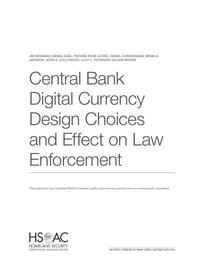Central Bank Digital Currency Design Choices and Effect on Law Enforcement
ResearchPublished Apr 16, 2025
ResearchPublished Apr 16, 2025

The Federal Reserve’s exploration of a U.S. Central Bank Digital Currency (CBDC) raises questions about its impact on U.S. law enforcement’s ability to detect and investigate crime. This report, informed by expert interviews and a scenario-based workshop, identifies key CBDC design choices affecting law enforcement capabilities. It underscores the need to evolve investigative techniques to meet relevant challenges if a U.S. CBDC is launched.
This research was sponsored by the Technology Centers Division at the U.S. Department of Homeland Security Science and Technology Directorate and conducted in the Infrastructure, Immigration, and Security Operations Program of the RAND Homeland Security Research Division.
This publication is part of the RAND research report series. Research reports present research findings and objective analysis that address the challenges facing the public and private sectors. All RAND research reports undergo rigorous peer review to ensure high standards for research quality and objectivity.
RAND is a nonprofit institution that helps improve policy and decisionmaking through research and analysis. RAND's publications do not necessarily reflect the opinions of its research clients and sponsors.